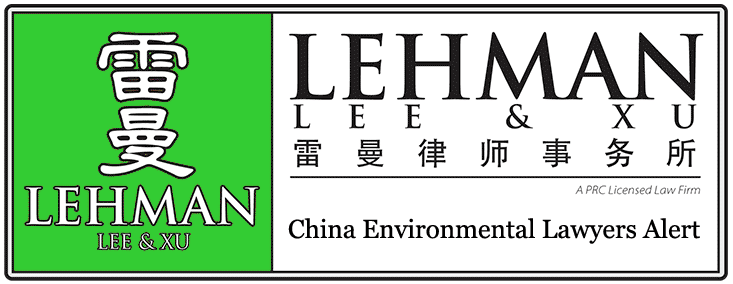
 |
|
LEHMAN, LEE & XU China Lawyers |
|
China Environmental Lawyers Alert |
|
December 2013 |
The China Law News keeps you on top of business, economic and political events in the China. |
|
|
|
In the News |
Who can initiate class-action lawsuits under the draft Environmental Protection Law? |
At the end of October 2013, the Standing Committee of China's National People's Congress (NPC) finalized the third draft of amendments to China's Environmental Protection Law (《环境保护法修正案(草案)》). In light of the extensive debate so far, many speculate that the Law will undergo a fourth draft before the New Environmental Protection Law enters into force. Such changes would constitute the first amendment to the Law since it came into force in 1989. Luo Jianhua (骆建华), the former deputy head of the NPC's Environment Protection and Resources Conservation Committee, explained that the amendments made so far emphasize seven key areas: i) the overall role of the law, ii) the responsibilities of local governments, iii) the sharing of environmental data, iv) preventing pollution related to farming in rural areas, v) public participation, vi) information transparency and vii) punishment. The issue that has taken center stage in the debate so far surrounds class-action law suits against environmental polluters. Under the current Law, the list of claimants that can initiate class-action law suits against polluters on behalf of the public is limited, with perhaps the best known being the quasi-governmental All-China Environment Federation (中华环保联合会). In order to effectively address areas v), vi) and vii), many argued, during the public comment phase on the second draft that, that the list should be extended to cover more claimants. Doing so might help to create, in the words of lawmaker, "a law with teeth that can bite". The third draft seems to reflect that the legislature is convinced by these arguments. It stipulates that "relevant organizations" must, in order to initiate an environmental class-action lawsuit, satisfy below conditions: Be a national organization, Be registered with the Civil Ministry, Have been continuously active for at least 5 years, and Have a "good standing". Currently 13 organizations satisfy the requirements. However, as the "good standing" condition gives the court a wide discretion to reject applications, it is difficult to determine who will be able to claim if the amendment is passed. Class-action law suits generally are a contentious topic in many countries. In Canada, there is also precedence for class-action law suits. However the grounds on which to initiate such claims are far narrower. While it is possible in the U.S. to bring a claim for mental anguish or emotional distress, such claims are unlikely to succeed in Canada. For example, in order for a member to raise a class action in Ontario, he must demonstrate that the class has "common issues". In light of pollution often having divergent effects on peoples' health, such "common issues" have only been established in cases involving damage to property. In the United Kingdom class-action lawsuits are not possible. The most similar mechanism is the Group Litigation Order. This involves parties demonstrating to the court that their cases "give rise to common and related issues" and should therefore be managed collectively. It is at the complete discretion of the Judge to award such an Order. In the most recent case involving an environmental pollutant, the Court of Appeal declined to group 500 individuals claiming damages on the ground that the parties' cases were not sufficiently similar in law and in fact. This case is often cited to demonstrate the difficulty in establishing such similarity. German law is similarly restrictive in allowing multi-party litigation. With very few exceptions – environmental claims against non-governmental polluters not being one of them – German law does not recognize class-action law suits. The parties can however apply to have their cases managed collectively. On June 11 2013 the European Commission, the executive body of the European Union, issued a Recommendation indicating that within two years Member States should adopt a mechanism for "collective redress" so as to allow claimants to seek damages or injunctive relieve on a collective basis. It specifically states that the availability of such redress would be of value for environmental protection. Therefore, despite the Recommendation being non-binding, it may result in class-action lawsuits against pollutants becoming available across Europe. It is not yet possible to determine which organizations would be able to initiate class-action litigation under the third draft of the Environmental Protection Law. However moving away from a definitive list of claimants to a 4-stage test would make the law more flexible. While the status quo may be retained, it is also possible that more NGOs may be allowed to initiate proceedings. In any case, the public debate about extending the number of parties that can initiate class-action lawsuits against polluters is a welcome one. While this may foster access to justice, it may also create the "litigation culture" that the U.S. is often criticized for. Especially in the politically sensitive area of environmental protection, this may do more harm than good. The hesitation of the Canadian, UK and German legal systems in adopting class-action law suits demonstrates this risk. http://www.lexology.com/library/detail.aspx?g=c001d154-79e3-4302-a30f-b91485637612 |
|
|
|
|